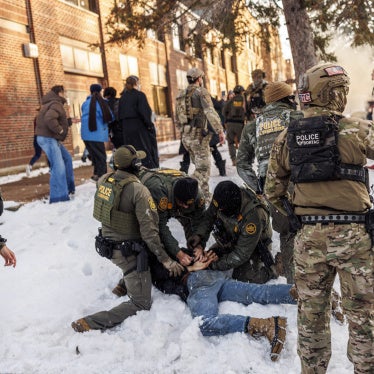The 2020 National Defense Authorization Act (NDAA) that President Donald Trump signed into law in late December didn’t seem to make big news in the Middle East at the time. But it should have. Among its disappointments was that the final version dropped sanctions against those responsible for the brutal killing of the Saudi journalist Jamal Khashoggi and eliminated proposed restrictions on arms sales to Saudi Arabia for its war crimes in Yemen.
But there are some promising elements of the new law. One of them is that Congress broadened its requirements for the Defense Department to report on whether and when it provides congressionally authorized funds to survivors of catastrophic loss at the hands of the U.S. military.
I met one of these survivors in Lebanon last year. Shadia A., whose full name I will withhold for her privacy, told me about the immense loss her family had suffered in eight years of the Syrian conflict. In 2014, one of the Syrian government’s barrel bombs destroyed her home. Her family fled to Lebanon.
In 2017, Shadia and her husband suffered a second devastating loss, when the U.S.-led anti-ISIS coalition struck their hometown, Mansourah, in northeastern Syria, killing her husband’s brother and wife, and leaving the couple’s three children orphaned in Syria. Eventually, Shadia and her family were able to take in her husband’s 26-year-old sister, who had suffered severe trauma in the strikes, and the three children: a 12-year-old girl who had broken fingers and soft tissue damage to her back; an 8-year-old boy whose arm had been broken, and a 7-year-old boy who escaped physical injury.
The March 20, 2017, attack had targeted ISIS fighters as part of a weeks-long military campaign to recapture the strategic Tabqa Dam about 25 miles from Raqqa, but it destroyed a three-story boarding school and other buildings. Although the U.S. initially denied that the attack had harmed civilians, it reopened its investigation following a September 2017 Human Rights Watch report into the incident. In June 2018, the U.S. concluded that “40 civilians were unintentionally killed” in the strike. Shadia’s relatives were among them.
Shadia has four children of her own. The family lives on a stipend of $250 a month from the United Nations refugee agency, UNHCR, as well as odd jobs her husband performs. She couldn’t register her newly arrived family members with UNHCR because Lebanon had stopped registering new refugees. Shadia occasionally receives additional funds from aid groups or the United Nations, but they have dwindled significantly.
On Oct. 30, 2018, I met with Pentagon officials in the Office of the Under Secretary of Defense for Policy, and submitted the details about Shadia’s family in writing. The Defense Department has a long tradition of providing ex gratia, or condolence, payments, in which the United States does not accept liability, to civilians who have been injured or suffer property damage, or to the families of those killed by U.S. military operations. These payments have been authorized in a variety of ways, and Congress sets aside money each year for this purpose through the NDAA. The locations for which the payments are authorized include Syria, although until only one such payment has been made public, for a strike that occurred in January 2019.
When I submitted this case to the then-Acting Deputy Assistant Secretary for Stability and Humanitarian Affairs – who in turn shared it with U.S. Central Command — I thought it would be a slam dunk. The coalition had admitted its error, the victims were easily accessible in Lebanon, and the facts showed that any funding would go to alleviate a significant burden resulting directly from the strike.
But almost a year to the day after I submitted the details, the Defense Department on Oct. 29, 2019, turned down the request and said the family should continue to seek humanitarian assistance. The notification stated:
“Prior to conducting the airstrike, CJTF-OIR took significant precautions to assess the risk of civilian casualties and other collateral damage, and did not assess the presence of civilian families. Although the result was tragic, U.S. forces complied with the law of war.”
The response misses the point of condolence payments entirely. Unlike in instances of laws-of-war violations, where the responsible party may be required by law to make full reparation for the loss or injury it caused, ex gratia payments are, according to the Defense Department itself, meant to “convey feelings of condolence or sympathy toward the victim or the victim’s family.” Although in the notification letter, the current Acting Deputy Assistant Secretary of Defense for Stability and Humanitarian Affairs, John Trigilio, did “express [his] deepest condolence for the losses and hardships suffered by the … family, as well as the other victims and families who have suffered and who continue to suffer as a result of the conflicts in Iraq and Syria…,” it is hard to find that meaningful in the absence of genuine efforts to help the family rebuild, or even an actual apology for the harm they suffered.
I haven’t told Shadia yet. I don’t know how to explain to her that the U.S. government – while acknowledging it killed 40 civilians – won’t help those who survived.
Shadia’s niece and nephews will grow up without their parents. The U.S. government can’t change that. But Congress has long recognized that the least the United States can do is provide some form of monetary redress to those who suffer the most in war. The new NDAA requires the Defense Department to report to Congress about its payments, including if no payments are made, and if not, why not. This provision may do little for Shadia, but it shows that Congress has the power to demand that survivors of the Mansourah strike receive U.S. funds to help them rebuild their lives.







